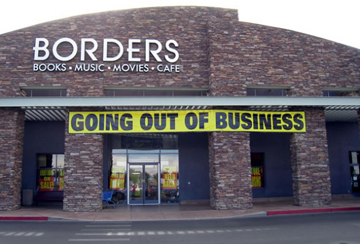When I saw Jason Ashlock take part in a panel on the future of book publishing at the Aspen Summer Words conference a few months ago, I immediately noticed something different about him: He lacked that black cloud of doom floating over his head that many people involved in the book industry tend to cower under these days.
Ashlock, who makes his living as a literary agent and multimedia book packager, was downright chipper even as he discussed the demise of bookstores, book reviews, and the traditional publishing model. Why is he so upbeat? Instead of worrying about what’s been lost, he focuses on capitalizing on the new enthusiasm among readers that the advent of e-books has created.
Ashlock is the founder and president of Movable Type Management, an agency that works with authors and digital developers to publish stories on a variety of platforms, including long-form journalism and multimedia e-books, film and television productions, and print books. I interviewed Ashlock via email about how he helped an author quickly produce a Jeremy Lin e-book before Linsanity abated, the old-fashioned publishing “bucket brigade,” how publishers need to “experiment and fail” in the e-book realm, and who he thinks will step in to fill the curatorial role that book reviews and bookstores used to handle.
5 Questions for Jason Ashlock
1. Many publishers and bookstores have suffered financial losses in recent years, but on the other hand, readers have embraced e-books and some studies show that people who own e-readers are reading more than ever before. Are you optimistic that readers’ enthusiasm for e-books will translate into new sources of revenue?
Jason Ashlock: I have the luxury of being optimistic because my position in publishing is as close as you can get to the author, and that’s the best place to be. The anxiety that big publishers, bookstores, and other traditional players in the value chain feel is due to myriad factors, economic and cultural, but the truth is, the farther you stand from the author, the more danger you’re in. The author’s all that matters now — the author and the reader. Everybody in the middle is in a period of redefinition.
My job is to lock arms with the author, help them craft outstanding stories, and help them find their way to the readers who right now are craving those stories — even if they don’t know it yet. It’s a great time to be an author and a reader. It’s not as great a time to be anyone else. If you’re a reader, there’s more great content than ever, it’s more accessible than ever, it’s better priced than ever. If you’re an author, you have more venues than ever, more control than ever, more access to powerful technology, more direct relationships with readers.
Because of this, reading culture is booming, which is tremendously exciting. It’s up to everyone who loves books and wants to work with them to find ways to advocate either for authors or readers — or both. If you can do this, you’ll survive, you’ll thrive, and you’ll be part of the future.
2. You’ve said one advantage of e-books is that they enable the publication of topical non-fiction and long essays — which would be too short for a traditional printed book — in a matter of weeks instead of months. Can you give an example of this from a project you’ve worked on?
Ashlock: Powerful publishing and distribution technology has changed how we produce books, dramatically reducing the time it takes to get great content ready to sell and out into the world. And the power and speed of the social web enables us to introduce products to readers more efficiently. The supply chain just simply isn’t as stretched as it used to be. The “bucket brigade” we engage to get a print book from author to agent to publisher to editor to printer to distributor to warehouse to bookstore isn’t necessary when you’re producing e-books. The realities of online retail create efficiencies that just can’t be found in the physical world. The roles still exist — author, agent, publisher, editor, production, distribution, retail — but the positions aren’t so discrete and the process isn’t so protracted.

We’ve seen this work often. In February, when a young and unknown benchwarmer on the New York Knicks basketball team named Jeremy Lin shot to international fame after a series of phenomenal performances, the appetite for information on this kid and the story of his unlikely success was strong: Linsanity was a global trend. So we commissioned one of our authors to write a short bio of Lin that introduced fans and followers to his backstory, as well as told the story of his meteoric rise. He wrote the 18,000-word digital short in three days; we built it over a weekend with one of our technology partners; and we had it out to retailers like Amazon and B&N within six days of Lin’s explosion onto the scene. Less than a week. Within two weeks, we’d sold that book to half a dozen foreign publishers who rushed it into translation and out to eager readers across Asia and Europe.
Around the same time, three big publishers contracted with sport writers for books on Jeremy Lin. It took them three months to get those to market, by which time Lin’s season had been ended by injury, the Knicks were sliding to eventual elimination, and the trend had crested and waned.
We’re big supporters of print publishing. But sometimes, digital publishing does it better. It opens up new opportunities to produce books that meet the demand of the market. And as the Lin book shows, it also allows us to publish in shorter formats than print publishing could support.
3. You said “the bookstore is disappearing,” and this is causing a huge adjustment in the publishing industry. If bookstores disappear as influential book reviews already have, how does an author get the word out about his books? Is the burden on the author to self-promote, or are there new avenues for discovery that you foresee arising?
Ashlock: In many communities, the bookstore is disappearing, or has already disappeared. The loss of hundreds of Borders, the regular shuttering of independents, the uncertainty of Barnes & Noble. There are pockets of resurgence in some areas, and we cheer on booksellers that are able to reinvent themselves as community gathering places and event spaces. But the hard truth is that the brick-and-mortar booksellers no longer hold the positions of influence in the lives of most readers that they once did. Your connection to book reviewers is apt: both means of discovering new authors, both channels for publishers to promote authors have largely dried up as book buying and book reviewing has moved almost entirely online.

The challenge is the same for all of us working in books: How do we cut through the noise and the clutter of culture to find an audience for deserving work? If I were to define a publisher in as few words as possible, I’d say this: A publisher is one who brings attention to good books. It’s as simple as that. But with the decline of bookstores, the reduction in influential reviews, and the shift from traditional media to the social web, the expertise a publisher once leveraged on behalf of authors is now less meaningful.
So as I mentioned earlier: This is the age of the author. It most certainly is the growing responsibility of the author to generate an audience for his or her work. Whether you’re traditionally published or self-publishing, the story is similar. The direct audience engagement enabled by the strength of online communities, and the suite of tools and technologies available to anyone with an Internet connection, create for each author the opportunity to replicate the power of bookstores and reviews. But by no means does that require that the author act alone in these endeavors. On the contrary, the immense challenge means it’s ever more important for an author to educate herself and create a team around her work.
4. You said the author’s “biggest enemy today is not piracy, but obscurity.” Is anyone stepping up to fulfill the curatorial role that book reviews and booksellers used to play?
Ashlock: The void is being filled in an ad hoc manner by a mixture of online community recommendations, such as book clubs and newsletters and social media, and the ever-inaccurate online reviews. But these aren’t sufficient for most readers. The transition out of the bookstore and review tradition is a difficult one, and curation and discovery is still in a state of disorientation.

I’m glad you ask that question in that way, because it’s for this very reason we’re launching TheRogueReader.com this fall. In short, The Rogue Reader is a digital publishing channel for outstanding suspense fiction. We select only the very best new voices in the category and introduce only one author a month to our readers. That’s it. We call it precision-curation. We help that one author produce elegant e-books, beautifully designed and carefully edited, and we position their novels in the market in very strategic ways.
We believe there is exceptional value in quality curation. The signal-to-noise ratio on the web is immense. How do we know what to pay attention to? What’s of value? What’s worth my time?
Theoretically, what publishers do is up the signal strength by their brand. For authors, publishers offer the sense of being selected. Authors know when they’re published by, say, Random House, that they have been chosen from among thousands of prospects. And readers know when they pick up a Random House book that professional book people have selected these as the works that should be attended to.
But increasingly, the self-publishing community is producing works of arguably equal quality that are just as popular and appealing. Last week, 27 out of the top 100 books on Amazon were independently published. But among the millions of self-published books —which were not curated, and went through no filtering — how do we know what to read? We rely upon trusted voices: recommendations of friends, buzz on social media, even very impersonal and regularly useless systems like how many stars a given book averages in a retail channel.
We believe that there is exceptional value in a highly curated channel that helps readers determine what to read in their favored categories. A publisher that curates well and builds a reputation for doing so is fundamentally lowering the signal-to-noise ratio. Filter out the noise, raise the strength of the signal. With The Rogue Reader we’re saying to readers: These are works of the highest caliber, by break-out writers, who are worth your time.
5. It seems that major publishers are having trouble adapting to all these rapid changes. Their businesses are organized around producing printed books at the same stately pace that they’ve always been printed. Some have speculated that the big six publishers might not be nimble enough to adapt to the rise of e-books, but that smaller presses might be. What do you think?
Ashlock: Look, publishers have built an efficient and effective business around selling print books. They’ve had a half-century to perfect the model, and they’re very good at what they do. But e-book publishing is not different in a few minor ways; it’s different in a thousand ways, some of which we’ve touched on here. Though some of their core strengths remain — editorial, for instance, or big author brand development — there are a thousand new things to be good at. All of the efficiencies they built into their model now aren’t quite so important, and new inefficiencies are introduced with every new technology, every shift in social media, and every consumer trend. It’s terribly difficult for major media conglomerates like Random House (Bertelsman) or HarperCollins (Fox) or Simon & Schuster (CBS) to change their very elaborate machinery.
It’s also, perhaps most frustratingly, not possible for these big companies to experiment and fail and learn to the degree that they need to in order to find out what works and how to do digital publishing better. Inside these corporations, risk and failure are anathema.
The dozens and dozens of new startups focused on publishing and the wealth of venture capital being poured into them are evidence that there is excitement and innovation in publishing right now. Unfortunately, not much of this is coming from the bigger companies. Change certainly doesn’t happen quickly for them. I do think some are in the midst of thoughtful and serious adjustment, and will come out as strong, multimedia companies in the next decade. I also think some will cease to exist as we know them today; they’ll be swallowed by the winners.
*****
Borders image courtesy of boydsworld via Flickr Creative Commons.
Jenny Shank first novel, “The Ringer,” is a finalist for the High Plains Book Award. She reviews books for the Dallas Morning News and the High Country News.

